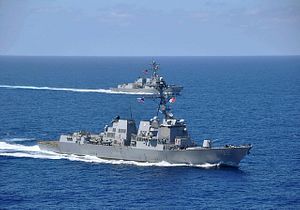Time for this week’s China links, including some updates on previous Diplomat stories:
I wrote yesterday about reports that the U.S. Navy plans to conduct freedom of navigation operations within 12 nautical miles of China’s artificial islands in the South China Sea. Foreign Ministry spokesperson Hua Chunying addressed the reports in a regular press conference on Friday, where she made China’s opposition clear.
China is “seriously concerned” about the reports, Hua said. She emphasized that China has always respected and protected every country’s right to freedom of navigation and overflight in accordance with international law in the South China Sea and around the world.
But China “will absolutely not permit any country to infringe on China’s territorial waters and airspace in the Spratly Islands in the name of ‘protecting freedom of navigation and overflight,’” Hua said. She urged “relevant parties” (the United States) not to resort to “provocative actions” and to “play a responsible role” in regional peace and stability.
The South China Morning Post looks in more detail at how China might respond if the United States does send naval vessels within the 12 nautical mile limits of Chinese-controlled features. The Chinese military experts interviewed in the piece said China’s navy would issue warnings – which the U.S. is sure to ignore. After that, there’s less consensus: one expert predicted China would send its own warships to intercept the U.S. vessels; another said China “could scramble drones to expel the vessels, or simply order the Second Artillery Corps to fire from distance.” The experts didn’t except any collisions between U.S. and Chinese troops, but agreed that China’s navy “was capable of expelling any intruders,” according to SCMP.
The Washington Post has some more positive news for U.S.-China relations, reporting that China has arrested suspected hackers based on information provided by the U.S. government. The arrests were made before Chinese President Xi Jinping’s visit to the United States, and experts cautioned that the Obama administration wants to see a public trial before becoming overly optimistic. Still, the arrests are potentially a big step forward in U.S.-China cyber cooperation, particularly given that the two sides just announced an agreement to jointly investigate cyber attacks and hacking attempts.
Last week, I wrote that China’s navy had sent ships to northern European countries for the first time. Fresh off a stint doing anti-piracy operations in the Gulf of Aden, Fleet 152 (consisting of a missile destroyer, a missile frigate, and a replenishment ship) visited Denmark, Finland, and Sweden on a goodwill tour – the first time any PLAN vessels had stopped in the northern European states. The fleet has since moved on to Poland, another first for China’s navy. Like this other visits, this stop-over will see exchanges of naval officers (including sporting matches as well as serious military-to-military talks) and the public will be allowed to tour the Chinese ships.
Finally, Jane Perlez of the New York Times has an in-depth profile of China’s new Nobel Prize winner, Tu Youyou, who claimed the prize for physiology and medicine earlier this week. Tu’s groundbreaking research into malaria was made possible by the political circumstances of the time – China’s leaders demanded the research, but the Cultural Revolution had discredited many of its leading scientists. That’s how Tu, an expert in Chinese traditional medicine, came to be placed on the project.

































